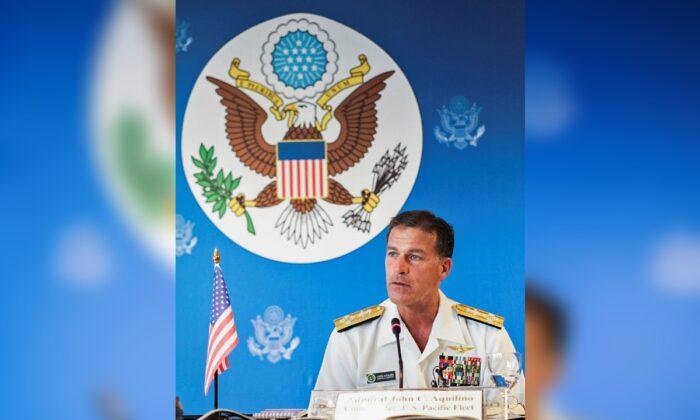BANGKOK—A partnership between the United States and “like-minded nations” will keep Asian countries secure in the face of competition from a rising China, the commander of the U.S. Pacific Fleet said on Dec. 13.
On a visit to Bangkok, Admiral John Aquilino, 56, criticized China’s construction of artificial islands in the South China Sea, a vital trade waterway with rich energy resources where Beijing has disputes with five nations.
“We are in competition with the People’s Republic of China,” Aquilino told reporters.
“We have inherent disagreement between ideologies. When the U.S. talks about values, those are values that like minded nations share ... And I believe that the strength of partnerships with those values will be what keeps the nations in the region secure.”
Tensions are high between China and the United States in Asia’s waters, where Washington says it is defending freedom of navigation in accordance with international law.
“I said we were in competition with China but that does not mean conflict,” Aquilino said. “We will cooperate where we can and we will compete where we must.”
Under the administration of U.S. President Donald Trump, some Southeast Asian nations have been concerned at a possible U.S. pullback just as China’s dominance grows, but Aquilino said the United States would be in the region for years to come.
He cited so-called freedom of navigation operations in both the South China Sea and Taiwan Strait in which the United States and allied warships have sailed through what China claims as its territorial waters, provoking Beijing’s ire.
Aquilino said that in the South China Sea, China had built features in defiance of international law, that damage the environment, have a military purpose and “ultimately coerce and bully nations in the region.”
However, on July 12, 2016, an arbitration court in The Hague found the Chinese regime’s claims to be false. In the U.N. tribunal’s ruling, China’s claims to virtually the entirety of the South China Sea were dismissed by the 5-member tribunal as having no historical basis. It was also determined that the multiple artificial islands that have been built by and used as bases by the Chinese military do not constitute territory entitled to zones of economic exclusivity. Rather, they were found to be in violation of the sovereignty of the Philippines. The Chinese Communist Party (CCP) immediately rejected the tribunal’s decision.
Brunei, Indonesia, Malaysia, the Philippines, Taiwan and Vietnam have competing claims to the waterway, through which passes about a third of global seaborne trade.






Friends Read Free